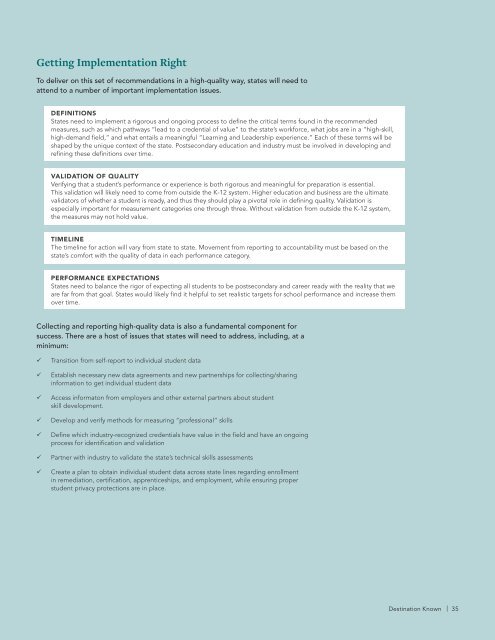Destination Known
2nIe2aC
2nIe2aC
Create successful ePaper yourself
Turn your PDF publications into a flip-book with our unique Google optimized e-Paper software.
Getting Implementation Right<br />
To deliver on this set of recommendations in a high-quality way, states will need to<br />
attend to a number of important implementation issues.<br />
• DEFINITIONS<br />
States need to implement a rigorous and ongoing process to define the critical terms found in the recommended<br />
measures, such as which pathways “lead to a credential of value” to the state’s workforce, what jobs are in a “high-skill,<br />
high-demand field,” and what entails a meaningful “Learning and Leadership experience.” Each of these terms will be<br />
shaped by the unique context of the state. Postsecondary education and industry must be involved in developing and<br />
refining these definitions over time.<br />
• VALIDATION OF QUALITY<br />
Verifying that a student’s performance or experience is both rigorous and meaningful for preparation is essential.<br />
This validation will likely need to come from outside the K-12 system. Higher education and business are the ultimate<br />
validators of whether a student is ready, and thus they should play a pivotal role in defining quality. Validation is<br />
especially important for measurement categories one through three. Without validation from outside the K-12 system,<br />
the measures may not hold value.<br />
• TIMELINE<br />
The timeline for action will vary from state to state. Movement from reporting to accountability must be based on the<br />
state’s comfort with the quality of data in each performance category.<br />
• PERFORMANCE EXPECTATIONS<br />
States need to balance the rigor of expecting all students to be postsecondary and career ready with the reality that we<br />
are far from that goal. States would likely find it helpful to set realistic targets for school performance and increase them<br />
over time.<br />
Collecting and reporting high-quality data is also a fundamental component for<br />
success. There are a host of issues that states will need to address, including, at a<br />
minimum:<br />
üü<br />
üü<br />
üü<br />
üü<br />
üü<br />
üü<br />
üü<br />
Transition from self-report to individual student data<br />
Establish necessary new data agreements and new partnerships for collecting/sharing<br />
information to get individual student data<br />
Access informaton from employers and other external partners about student<br />
skill development.<br />
Develop and verify methods for measuring “professional” skills<br />
Define which industry-recognized credentials have value in the field and have an ongoing<br />
process for identification and validation<br />
Partner with industry to validate the state’s technical skills assessments<br />
Create a plan to obtain individual student data across state lines regarding enrollment<br />
in remediation, certification, apprenticeships, and employment, while ensuring proper<br />
student privacy protections are in place.<br />
<strong>Destination</strong> <strong>Known</strong> | 35


